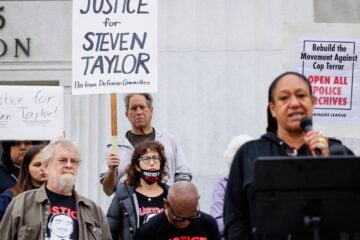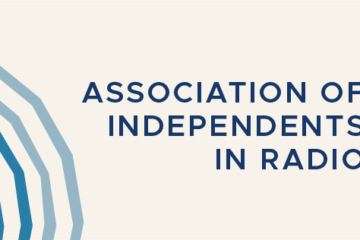Educational Television Facilities Act of 1962
With this law, signed by President Kennedy on May 1, 1962, Congress gave the first major federal aid to public broadcasting. The grants for new and replacement facilities and equipment were overseen by the Office of Education in the Department of Health, Education and Welfare.
The successor Public Telecommunications Facilities Program (PTFP) was operated by the National Telecommunications and Information Administration (NTIA) in the Department of Commerce until 2011, when budget cutbacks ended PTFP appropriations (Current, April 18, 2001).
The act became Part IV of the Public Broadcasting Act:
PART IV — GRANTS FOR EDUCATIONAL TELEVISION BROADCASTING FACILITIES
Declaration of Purpose
SEC. 390. The purpose of this part is to assist (through matching grants) in the construction of educational television broadcasting facilities.
Authorization of appropriations
SEC. 391. There are authorized to be appropriated for the fiscal year ending June 30, 1963, and each of the four succeeding fiscal years such sums, not exceeding $32,000,000 in the aggregate, as may be necessary to carry out the purposes of section 390. Sums appropriated pursuant to this section shall remain available for payment of grants for projects for which applications, approved under section 392, have been submitted under such section prior to July 1, 1968.
Grants for construction
SEC. 392. (a) For each project for the construction of educational television broadcasting facilities there shall be submitted to the Secretary an application for a grant containing such information with respect to such project as the Secretary may by regulation require, including the total cost of such project and the amount of the Federal grant requested for such project, and providing assurance satisfactory to the Secretary — ;
(1) that the applicant is (A) an agency or officer responsible for the supervision of public elementary or secondary education or public higher education within that State, or within a political sub division thereof, (B) the State educational television agency, (C) a college or university deriving its support in whole or in part from tax revenues, or (D) a nonprofit foundation, corporation, or association which is organized primarily to engage in or en courage educational television broadcasting and is eligible to receive a license from the Federal Communications Commission for a noncommercial educational television broadcasting station pursuant to the rules and regulations of the Commission in effect on April 12, 1962;
(2) that the operation of such educational television broadcasting facilities will be under the control of the applicant or a person qualified under paragraph (1) to be such an applicant;
(3) that necessary funds to construct, operate, and maintain such educational television broadcasting facilities will be available when needed; and
(4) that such television broadcasting facilities will be used only for educational purposes.
(b) The total amount of grants under this part for the construction of educational television broadcasting facilities to be situated in any State shall not exceed $1,000,000.
(c) In order to assure proper coordination of construction of educational television broadcasting facilities within each State which has established a State educational television agency, each applicant for a grant under this section for a project for construction of such facilities in such State, other than such agency, shall notify such agency of each application for such a grant which is submitted by it to the Secretary, and the Secretary shall advise such agency with respect to the disposition of each such application.
(d) The Secretary shall base his determinations of whether to approve applications for grants under this section and the amount of such grants on criteria set forth in regulations and designed to achieve (1) prompt and effective use of all educational television channels remaining available, (2) equitable geographical distribution of educational television broadcasting facilities throughout the States, and (3) provision of educational television broadcasting facilities which will serve the greatest number of persons and serve them in as many areas as possible, and which are adaptable to the broadest educational uses.
(e) Upon approving any application under this section with respect to any project, the Secretary shall make a grant to the applicant in the amount determined by him, but not exceeding (1) 50 per centum of the amount which he determines to be the reasonable and necessary cost of such project, plus (2) 25 per centum of the amount which he determines to be the reasonable and necessary cost of any educational television broad casting facilities owned by the applicant on the date on which it files such application; except that (A) the total amount of any grant made under this section with respect to any project may not exceed 75 per centum of the amount determined by the Secretary to be the reasonable and necessary cost of such project; and (B) not more than 15 per centum of any such grant may be used for the acquisition and installation of microwave equipment, boosters, translators, and repeaters which are to be used to connect two or more broadcasting stations. The Secretary shall pay such amount, in advance or by way of reimbursement, and in such installments consistent with construction progress, as he may determine.
(f) If, within ten years after completion of any project for construction of educational television broadcasting facilities with respect to which a grant has been made under this section — ;
(1) the applicant or other owner of such facilities ceases to be an agency, officer, institution, foundation, corporation, or association described in subsection (a) (1), or
(2) such facilities cease to be used for educational television purposes (unless the Secretary determines, in accordance with regulations, that there is good cause for releasing the applicant or other owner from the obligation so to do), the United States shall be entitled to recover from the applicant or other owner of such facilities the amount bearing the same ratio to the then value (as determined by agreement of the parties or by action brought in the United States district court for the district in which such facilities are situated) of such facilities, as the amount of the Federal participation bore to the cost of construction of such facilities.
Records
SEC. 393. (a) Each recipient of assistance under this part shall keep such records as may be reasonably necessary to enable the Secretary to carry out his functions under this part, including records which fully disclose the amount and the disposition by such recipient of the proceeds of such assistance, the total cost of the project or undertaking in connection with which such assistance is given or used, and the amount and nature of that portion of the cost of the project or undertaking supplied by other sources, and such other records as will facilitate an effective audit.
(b) The Secretary and the Comptroller General of the United States, any of their duly authorized representatives, shall have access for the purpose of audit and examination to any books, documents, papers, and records of the recipient that are pertinent to assistance received under this part.
Definitions
SEC. 394. For the purposes of this part —
(1) The term “State” includes the District of Columbia and the Commonwealth of Puerto Rico.
(2) The term “construction,” as applied to educational television broadcasting facilities, means the acquisition and installation of transmission apparatus (including towers, microwave equipment, boosters, translators, repeaters, mobile equipment, and video- recording equipment) necessary for television broadcasting, including apparatus which may incidentally be used for transmitting closed circuit television programs, but does not include the construction or repair of structures to house such apparatus.
(3) The term “Secretary” means the Secretary of Health, Education, and Welfare.
(4) The term, “State educational television agency” means (A) a board or commission established by State law for the purpose of promoting educational television within a State, (B) a board or commission appointed by the Governor of a State for such purpose if such appointment is not inconsistent with State law, or (C) a State officer or agency responsible for the supervision of public elementary or secondary education or public higher education within the State which has been designated by the Governor to assume responsibility for the promotion of educational television; and, in the case of the District of Columbia, the term “Governor” means the Board of Commissioners of the District of Columbia.
(5) The term “nonprofit” as applied to any foundation, corporation, or association, means a foundation, corporation, or association, no part of the net earnings of which inures, or may lawfully inure, to the benefit of any private shareholder or individual.
Provision of assistance by Federal Communications Commission
SEC. 395. The Federal Communications Commission is authorized to provide such assistance in carrying out the provisions of this part as may be requested by the Secretary. The Secretary shall provide for consultation and close cooperation with the Federal Communications Commission in the administration of his functions under this part which are of interest to or affect the functions of the Commission.
Rules and regulations
SEC. 396. The Secretary is authorized to make such rules and regulations as may be necessary to carry out this part, including regulations relating to the order of priority in approving applications for projects under section 392 or to determining the amounts of grants for such projects.
Federal interference or control prohibited
SEC. 397. Nothing contained in this part shall be deemed (1) to amend any other provision of, or requirement under this Act; or (2) to authorize any department, agency, officer, or employee of the United States to exercise any direction, supervision, or control over educational television broad casting or over the curriculum, program of instruction, or personnel of any educational institution, school system, or educational broadcasting station or system.






KVIE has a commerative picture and signing pen of this historic day for public broadcasting.